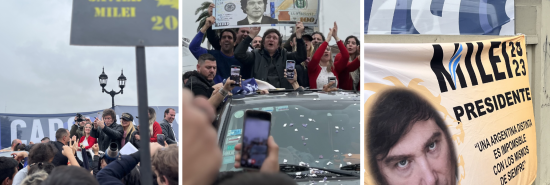
With Argentina ravaged by inflation, presidential candidate touts the US dollar
Tiana Lowe Doescher
Video Embed
TIGRE, Argentina — Millennials and zoomers wave bright yellow “Don’t Tread On Me” flags at truckers and bus drivers enthusiastically beeping their horns while passing the rally. The man of the hour, distinguished by a famous mop of hair replicated by some wigs in the crowd, carries an enormous $100 greenback.
But the populist politician galvanizing an entire generation is not former President Donald Trump nor Sen. Bernie Sanders (I-VT), and the country in question is not the United States. Rather, in this town just north of Buenos Aires, and across Argentina, it is radical monetarist Javier Milei.
CORY BOOKER CALLS ON NEW JERSEY COLLEAGUE MENENDEZ TO RESIGN AMID INDICTMENT UPROAR
He has taken Argentina by storm and convinced a plurality of its population, disproportionately its young people, to shutter the South American nation’s central bank and adopt the U.S. dollar as its currency. Against all odds, Milei and the Libertarian Party dominated Argentina’s presidential primary and are slated to sweep the general election.
One hundred years ago, Argentina, whose very name means “made of silver,” was one of the 10 richest nations on the planet. Today, Argentina’s GDP per capita is slightly more than that of Libya but lower than those of Russia and Kazakhstan. The culprit? The country’s addiction to printing its way out of its Peronist debt obligations. With a monthly inflation rate of 12.4% as of press time, average prices are more than doubling within a span of six months.
In practice, this level of hyperinflation eviscerates not just savings but the value of paychecks in real time. Argentines have zero incentive to save, and thanks to the sheer cost of using credit cards and their requisite unfavorable exchange rates, consumers use cash, physical stacks of it, to spend away their wages at packed bars and restaurants.
And why not eat, drink, and dance those pesos away? That’s why inflation, or borrowing from the future value of a dollar to pay for present debt, is so pernicious: It’s not as though a paycheck in Argentina can be saved for a home or a car.
Rather than follow the typical Argentine playbook of the past year — incur more debt, devalue the peso, print more, and repeat — Milei has embraced the notion of dollarization. Popularized by economists Emilio Ocampo and Nicolas Cachanosky, “dollarization” would simply work around Argentina’s central bank, replacing the Argentine peso with the U.S. dollar as the nation’s legal tender. The money printer, historically turned on by the central bank at the behest of Argentina’s increasingly profligate nanny state, would be shut off, and the dollar supply would be solely dictated by the U.S. Treasury.
While Trump, Sanders, and the American populists on their respective flanks have called for the U.S. central bank to loosen monetary policy with the express goal of financing further deficit spending, Milei has thrust strict classical monetarism atop the mantle of populism in Argentina. Dollarization is no mere policy prescription included in a longer list. Instead, it is as core to Milei’s appeal as “build the wall” or “Make America Great Again” are to Trump or “Medicare for All” to Sanders and other far-left figures.
While the Milei supporters across Tigre were enthusiastic in their assertion that “a different Argentina is impossible with the same old people in power,” the candidate has caught fire because of an idea as radical as dollarization, not the other way around.
Though even Ocampo and Cachanosky, the intellectual architects of dollarization who inspired Milei’s campaign, admit the process is no total panacea.
CLICK HERE TO READ MORE FROM THE WASHINGTON EXAMINER
“Monetary authority alone cannot eradicate inflation if the political power resists reducing public spending and the fiscal deficit,” the two write in their landmark book. Dollarization simply severs the power of the money printer from the control of the central government, forcing its constraint and subsequent reliance on the U.S. government, lest Uncle Sam refuse to learn from the cautionary tale of Argentina’s centurylong-failed experiment of whether a government can simply print, not grow, its way out of a vast welfare state.
The greenback has given Argentina an emergency exit, but the U.S. and the rest of the global economy have no such thing. China and its allies’ attempts to “de-dollarize” the planet will fail so long as the USD continues to reign supreme. But if our presidents decide to follow Juan Peron and the dollar goes the way of the Argentine peso with them, there will be no fallback for the West, just stacks of increasingly worthless cash, black markets, and young people with nothing left to save for but to spend everything for today.
